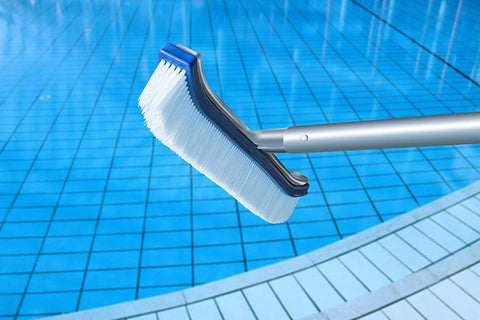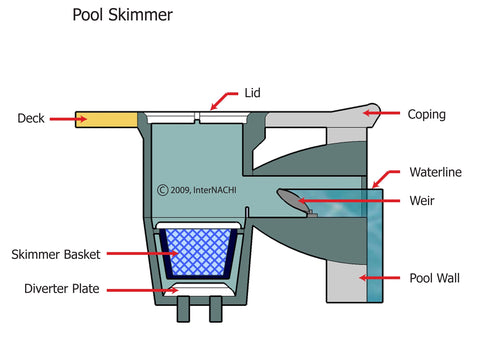
Essential for Summer - 5 Recommended Pool Tools
As you begin to plan your summer swimming pool adventures, it is important to make sure all your pool tools are tested and ready. In this article we'll explore our five best-selling and most essential pool tools. All five of these pool tools are designed to make your summer more fun and your pool more beautiful.
Pool Tool 1 - Pool Brush

No mater how much automation you add to your swimming pool operations, regular brushing will always be a part of your pool maintenance routine. Regular brushing of all pool surfaces is the best way to prevent algae from growing and spreading. You pool's sanitizer and circulation will control algal growth. However, there are small dead spots in most pools that receive pool circulation. These spots are perfect for algae to take advantage of.
Regular brushing of pool surfaces forces algae from these dead spots and back into the stream of circulation. Once in circulation, the sanitizer will neutralize the suspended algae.
Pool brushes will need to be replaced every two or three years. Steel bristles will bend and fray over time. Steel bristles are the recommended pool tool for concrete swimming pools.
Nylon bristle brushes are designed for above ground and inground pools with vinyl liners. Eventually pool brushes with nylon bristles will start to shed their bristles. You will see them floating on you pool's surface. This is a good indication that it's time for a new brush.
Pool Tool 2 - Pool Skimmer

Your pool skimmer is a partially passive pool tool. It will continue operating while you pump is running. Your pool skimmers house your skimmer baskets which provide filtration of large debris. I'm often amazed at the things I fins in my skimmer baskets.
Your pool skimmer consists of an opening to your pool, a skimmer door or weir, a pooling cavity that has a pipe connecting directly to your pump that leads to your pool filter.
The skimmer door or weir is lightweight and filler with air or foam. When your pump is on the weir is pulled down into the open position. This allows floating debris to enter and be pulled into the skimmer basket for easy removal. When your circulation pump is not on the weir will float back up into the closed position. This action prevents debris in the skimmer from re-entering the pool.
It is important to check your skimmer weirs and baskets at least once a year. These pieces are made of plastic and will need to be replaced from time to time. You should check your skimmer baskets regularly and remove debris as needed. Maintaining you pool skimmer will add life to your pump and filter.
Pool Tool 3 - Pool Rake

A pool rake, sometimes called a pool net, is the easiest way to remove debris from the surface and floor of your pool. If you clear your swimming pool of all debris regularly, you will reduce the chance of cascading water quality issues.
As you probably know, algae can be one of the biggest headaches for pool owners. This is because algae is everywhere. Algae is carried into your pool by leaves, insects, pollen, wind, and many other sources. Algal contamination can be reduces my promptly removing environmental debris from the water.
Leaves and other larger debris will descend to the bottom of the pool if not removed quickly. If these items are too big for vacuum systems, they will need to be removed by your pool rake before vacuuming. A telegraphing pool pole may be required to remove items from the deepest part of your pool.
Pool Tool 4 - Pool Vacuum or Robotic Cleaner

Removing small debris and algae from you pool surfaces is an important step in keeping your pool clean. Your pool tool of choice may be a waste/pump driven vacuum rig or a robotic pool cleaner. Either way, this is one of your most important pool tools.
Manual Pool Vacuum
Manual pool vacuums are probably the coolest pool tool available. Making use of your pool's pump or gravity, manual pool vacuum systems perform a job that would otherwise be very difficult. A manual system typically involves three main parts, a vacuum head, a vacuum hose, and a telescoping pool pole.
Pool Vacuum Head
There are many different types of vacuum heads available on the market today. You can fine all shapes and sizes with plenty of bells and whistles. However, the elegance of a manual vacuum set up is it's simplicity. It is a good idea to check all the moving parts on your vacuum head for wear and broken wheels. A good vacuum head should last at least three years.
Pool Vacuum Hose
The pool vacuum hose will connect to you vacuum head and the waste removal line. Normally, this setting can be found on the spider valve on top of your filter. It is important to check your hose for leaks. Leaks will reduce the suction in the system and decrease your vacuuming power.
Telescoping Pool Pole
A telescoping pool pole will attach to the vacuum head. This pole gives you the ability to guide your vacuum along the pool floor. The telescoping action of the pole allows it to expand in length giving you great reach from the pool deck.
Robotic Pool Cleaner

Robotic pool cleaners give you the ability to automate your pool vacuuming. This is very helpful because vacuuming is one of the most time consuming tasks of pool maintenance.
Pool robots are very efficient but they can also be quite pricy. A good robotic pool cleaner can range in price from $800 - $1400 depending on the model. Personally, I have manually vacuumed our pool since we bought the house. But, at the end of every summer, I promise myself that I will purchase one the next spring.
Floating Chemical Dispenser

If you system is not equipped with and inline chlorination system, a floating chemical dispenser is a must. A floating dispenser is the best way to evenly distribute your sanitizer throughout your swimming pool.
Using a floating dispenser will also protect you pump and filter from corrosion that can be caused by placing chlorine tablets into your skimmer baskets. When you place chlorine tablets into you skimmer baskets, you are forcing highly chlorinated, corrosive water directly into your pump and filter. This will decrease the lifespan of your most expensive equipment.
During pool season, you will spend countless hours enjoying your pool. These hours of enjoyment depend on the work you do to maintain you pool. Purchasing and using the right tools to clean your pool will save you time and help you maintain the crystal clear water that everyone loves!
